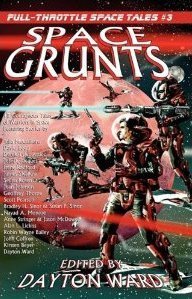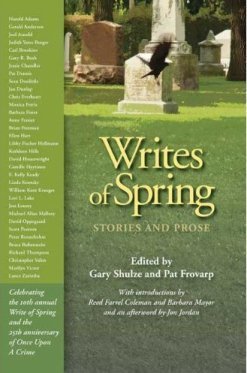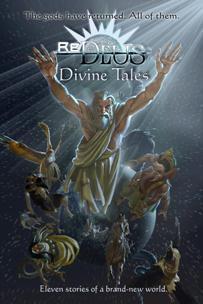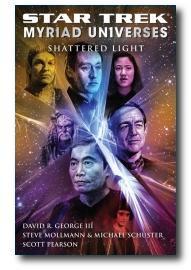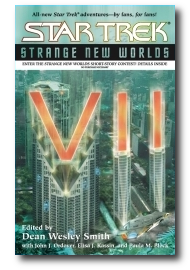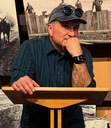Author Interview: Scott Pearson
The third victim--uh, writer--on my interview list from the ReDeus: Divine Tales anthology is a man of many hats. Scott Pearson is a fiction and media tie-in writer, self publisher, editor for two other publishers, and a dad. I don't know if or when he sleeps, but let's find out how Scott manages it all!
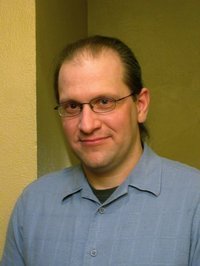
First, tell us where we can find you online.
www.yeahsure.net & www.generationsgeek.com
www.facebook.com/yeahsure & www.facebook.com/GenerationsGeek
@smichaelpearson & @generationsgeek
My infrequent blog, Enemy Lines: Dispatches from a Cranky Writer, is on Live Journal, Tumblr, Word Press, and Blog Spot.
At what point in your life did you realize your passion for fiction writing and storytelling? What was the first story you completed (published or not)?
I loved writing in grade school and knew I wanted to be a writer by the seventh grade. I have no specific memory of my first completed story because it was over thirty-five years ago. And it was bad, no doubt about that, you have to write a lot of bad stories when you start. My first published story was “The Mailbox” in 1987. I’ve put a slightly revised version of that on sale electronically. You could call it the twenty-fifth anniversary edition.
How did your story “Finders Keepers” come to be included in the anthology, Full-Throttle Space Tales #3: Space Grunts (Flying Pen Press, 2009) edited by Dayton Ward?
I got to know Dayton because we were both writing Star Trek for Simon & Schuster. At the Shore Leave convention in 2008, he invited several of us Trek writers to submit for Space Grunts, and I jumped at the chance to do something different. I’d never tried military science fiction before. Trek obviously has military elements, but Space Grunts had a straightforward military theme. Obviously I was pleased that my story made the cut.
In addition to SF, you also contributed mystery stories to such anthologies as Resort to Murder (Nodin Press, 2007) and Writes of Spring (Nodin Press, 2012). Do you find yourself writing with a different voice and style depending on which genre you’re writing? If so, how do they differ?
Each piece has its own needs, and various genres have motifs you need to honor to make them work. “Out of the Jacuzzi, Into the Sauna,” in Resort to Murder, belongs to the subgenre of amateur sleuths, a civilian who gets mixed up in a crime and thinks, “Gee whiz, let’s solve it ourselves!” It’s also a comedy featuring a wise-cracking female lead with a big tip of the hat to the great screwball comedies of Katharine Hepburn, so it needed a lot of fast-paced and irreverent dialogue.
That contrasts with “Finders Keepers,” from Space Grunts, which also had a female lead, but she was a marine. She had to be very focused, hard-core, ready to kick some ass. So the character and the genre dictate much of the voice and style you need to have an authentic story and believable characters within that genre. With some luck and some craft, you hope to develop a personal style that also informs the way you treat each story.
You’ve also had three Star Trek short stories and a novella published by Simon & Schuster. Did you write any Star Trek or other fan fiction prior to your media tie-in work?
I’ve never written any fan fiction, in the sense of something I circulated for free, which I find strange. I really don’t understand why. I guess part of it is simply because I decided I wanted to be a professional writer so early. It just never occurred to me to write simply for the fun of writing without an eye toward professional publication. But I want to make it very clear that I love the idea of fan fiction, and I think it’s great that people explore their favorite shows and movies in this way. I never wrote a word of Trek fiction that I wasn’t trying to sell to Simon & Schuster, but, really, it’s all fan fiction, written from a deep love of the show. Mine just got published.
What was the impetus for launching your own publishing imprint, Stuck in the Middle Press ?
I’ve got a number of short stories, some previously published, some not, that I think are worthy efforts on my part but that don’t have a lot of markets available to them for one reason or another. Instead of letting them gather dust, I decided to get with the twenty-first century and put them out there for ninety-nine cents a pop. It’s a very small-scale experiment that I’m doing at a glacial pace. We’ve all heard the lightning-strike stories of people getting rich self-publishing, but most people making some money this way are writers who have already developed a fan base through traditional publishing. So I’m still putting most of my efforts toward that.
You and I both have stories in the new anthology, ReDeus: Divine Tales (Crazy 8 Press, August 2012). What inspired, “The Tale of the Nouveau Templar”?
Several months ago I was putting together notes on some original novel ideas. I wanted a handful of ideas to bounce off friends before deciding what to pursue. I came up with four and a half ideas. Four were fairly full ideas with at least beginnings and middles and some even had endings. But that half idea was just a disembodied scene involving a Knight Templar who wakes up in the modern world after being burned at the stake in 1307. He’d lost his faith while fighting in the Crusades and didn’t know what to do next, but was burned before really dealing with his thoughts. That scene had popped into my head out of nowhere, but I didn’t know anything more about it and couldn’t figure out what to do with it. When I heard about the ReDeus concept, suddenly I had a context for that scene. Because he was a cynical loner because of his past, I couldn’t help thinking of the classic hard-boiled detectives portrayed by Humphrey Bogart. So the story became a mash-up of the noir detective story and the urban fantasy concept of the return of the gods to the modern world. Which ties back into your question about style and voice, because I had to make it fit into the ReDeus world while still evoking elements of old detective movies. It was a lot of fun to write.
As an editor for two publishers (with nearly identical names), do you find it challenging to make time for writing? What time management advice might you have for new writers?
I’d be very happy if I could give time management advice, because it would mean I knew how to do it myself. Unfortunately, juggling a day job with family and friends , occasional freelance editing and writing jobs, and my own original writing remains a huge challenge. I grab time whenever I can, often staying up too late at night or neglecting a yard desperately in need of weeding, watering, or mowing. Weekends aren’t really time off, because I spend so much time writing. It is getting a little bit easier now that my daughter is a teenager and happy to be off on her own or with her friends. So what did I do? I came up with a podcast called Generations Geek that she and I are doing together. But you could hear similar stories from most writers. Most don’t make a living from it, so you pursue it as best you can in the time you make available for it.
What can readers expect next from you?
I have a story, “On My Side,” in an upcoming anthology from Hadley Rille Books, A Quiet Shelter There. The
theme of this speculative anthology is companion and service animals, and 70 percent of profits will be
donated to Friends of Homeless Animals (www.foha.org). It was a great mash up, service animals and
speculative fiction. The release date is to be determined.
Beyond that, everything gets even more vague, but I do have other irons in the fire over the next year or so.
When I know more I’ll post about them.
What does Scott Pearson do when he isn’t writing or editing?
I do a lot of reading. (Related to that, I write a couple of book reviews a month, one for the print publication Suspense Magazine, one for the online Author Magazine. Sorry for mentioning more writing!) I’m trying to make more time for movies and I love computer games far more than I ever have time for. I want to start digitizing old LPs, but instead spend more time listening to CDs. I like keeping up with friends around the country via social media, as well as spending time with local friends over a good glass of wine. Bill Leisner and I get together now and then and try to figure out how to take over the writing world. You know, the usual stuff.
